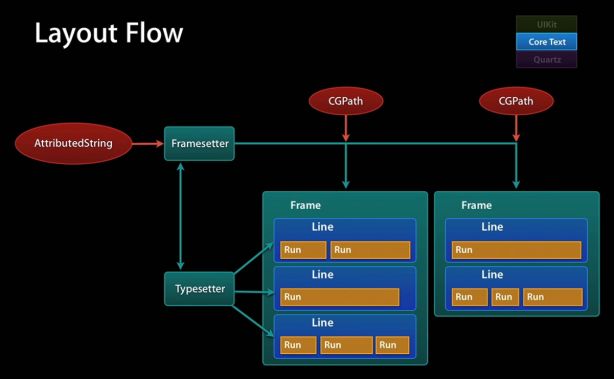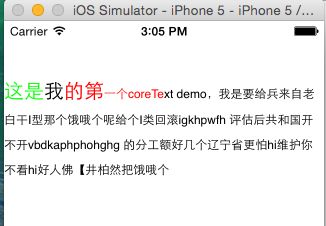CoreText使用教程(一)
本篇教程为第一篇,仅实现在一个UIView的子控件上绘制纯文本。
Github地址:https://github.com/JlongTian/JLCoreTextOne
学习CoreText需要有一些基础知识储备,关于字符和字形的知识请点击这里以及这里。另外还需要对NSAttributedString有一些了解,CoreText对文本和图片的绘制就是依赖于NSAttributedString属性字符串的。
说下CoreText的绘制过程,先上一张图片:
整个流程大概是:获取上下文-》翻转坐标系-》创建NSAttributedString-》根据NSAttributedString创建CTFramesetterRef-》创建绘制区域CGPathRef-》根据CTFramesetterRef和CGPathRef创建CTFrame-》CTFrameDraw绘制。
上图大概显示了后半部分的结构。 CTFrame是指整个该UIView子控件的绘制区域,CTLine则是指每一行,CTRun则是每一段具有一样属性的字符串。比如某段字体大小、颜色都一致的字符串为一个CTRun,CTRun不可以跨行,不管属性一致或不一致。通常的结构是每一个CTFrame有多个CTLine,每一个CTLine有多个CTRun。
本次纯文本实现的效果图如下:
控制器的代码处理很简单,UIView子控件的drawRect的代码如下:
-(void)drawRect:(CGRect)rect{
[super drawRect:rect];
// 1.获取上下文
CGContextRef contextRef = UIGraphicsGetCurrentContext();
// [a,b,c,d,tx,ty]
NSLog(@"转换前的坐标:%@",NSStringFromCGAffineTransform(CGContextGetCTM(contextRef)));
// 2.转换坐标系,CoreText的原点在左下角,UIKit原点在左上角
CGContextSetTextMatrix(contextRef, CGAffineTransformIdentity);
// 这两种转换坐标的方式效果一样
// 2.1
// CGContextTranslateCTM(contextRef, 0, self.bounds.size.height);
// CGContextScaleCTM(contextRef, 1.0, -1.0);
// 2.2
CGContextConcatCTM(contextRef, CGAffineTransformMake(1, 0, 0, -1, 0, self.bounds.size.height));
NSLog(@"转换后的坐标:%@",NSStringFromCGAffineTransform(CGContextGetCTM(contextRef)));
// 3.创建绘制区域,可以对path进行个性化裁剪以改变显示区域
CGMutablePathRef path = CGPathCreateMutable();
CGPathAddRect(path, NULL, self.bounds);
// CGPathAddEllipseInRect(path, NULL, self.bounds);
// 4.创建需要绘制的文字
NSMutableAttributedString *attributed = [[NSMutableAttributedString alloc] initWithString:@"这是我的第一个coreText demo,我是要给兵来自老白干I型那个饿哦个呢给个I类回滚yes we can 评估后共和国开不开vbdkaphphohghg 的分工额好几个辽宁省更怕hi维护你不看hi好人佛【井柏然把饿哦个"];
[attributed addAttribute:NSFontAttributeName value:[UIFont systemFontOfSize:20] range:NSMakeRange(0, 5)];
// 两种方式皆可
[attributed addAttribute:NSForegroundColorAttributeName value:[UIColor redColor] range:NSMakeRange(3, 10)];
[attributed addAttribute:(id)kCTForegroundColorAttributeName value:[UIColor greenColor] range:NSMakeRange(0, 2)];
// 设置行距等样式
CGFloat lineSpace = 10; // 行距一般取决于这个值
CGFloat lineSpaceMax = 20;
CGFloat lineSpaceMin = 2;
const CFIndex kNumberOfSettings = 3;
// 结构体数组
CTParagraphStyleSetting theSettings[kNumberOfSettings] = {
{kCTParagraphStyleSpecifierLineSpacingAdjustment,sizeof(CGFloat),&lineSpace},
{kCTParagraphStyleSpecifierMaximumLineSpacing,sizeof(CGFloat),&lineSpaceMax},
{kCTParagraphStyleSpecifierMinimumLineSpacing,sizeof(CGFloat),&lineSpaceMin}
};
CTParagraphStyleRef theParagraphRef = CTParagraphStyleCreate(theSettings, kNumberOfSettings);
// 单个元素的形式
// CTParagraphStyleSetting theSettings = {kCTParagraphStyleSpecifierLineSpacingAdjustment,sizeof(CGFloat),&lineSpace};
// CTParagraphStyleRef theParagraphRef = CTParagraphStyleCreate(&theSettings, kNumberOfSettings);
// 两种方式皆可
// [attributed addAttribute:(id)kCTParagraphStyleAttributeName value:(__bridge id)theParagraphRef range:NSMakeRange(0, attributed.length)];
// 将设置的行距应用于整段文字
[attributed addAttribute:NSParagraphStyleAttributeName value:(__bridge id)(theParagraphRef) range:NSMakeRange(0, attributed.length)];
CFRelease(theParagraphRef);
//设置字间距
long number = 2.0;
CFNumberRef num = CFNumberCreate(kCFAllocatorDefault,kCFNumberSInt8Type,&number);
[attributed addAttribute:(id)kCTKernAttributeName value:(__bridge id)num range:NSMakeRange(0,[attributed length])];
CFRelease(num);
// 5.根据NSAttributedString生成CTFramesetterRef
CTFramesetterRef framesetter = CTFramesetterCreateWithAttributedString((CFAttributedStringRef)attributed);
CTFrameRef ctFrame = CTFramesetterCreateFrame(framesetter, CFRangeMake(0, attributed.length), path, NULL);
// 6.绘制除图片以外的部分
CTFrameDraw(ctFrame, contextRef);
// 7.内存管理,ARC不能管理CF开头的对象,需要我们自己手动释放内存
CFRelease(path);
CFRelease(framesetter);
CFRelease(ctFrame);
}
在整个绘制过程中,NSMutableAttributedString是最重要的,给字符串设定不同的字体大小,颜色,乃至行距都是靠它,包括后面用空白占位符来给图片占位,也依然是依赖该字符串。

